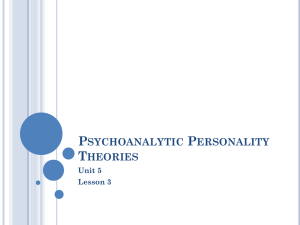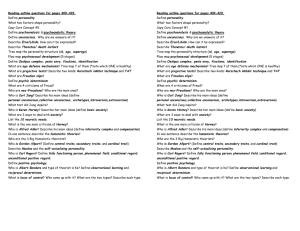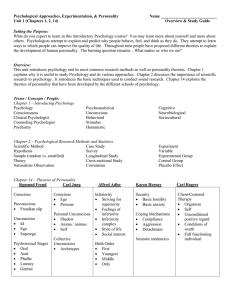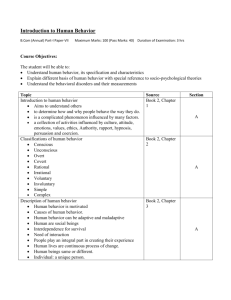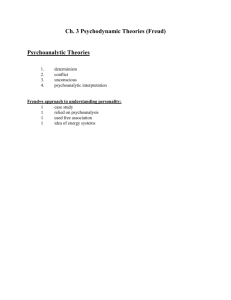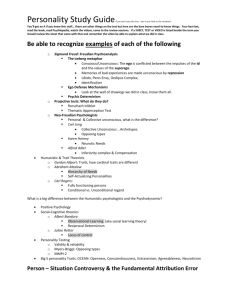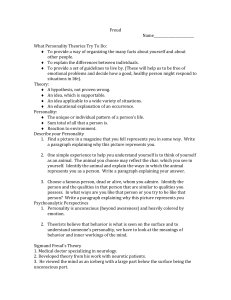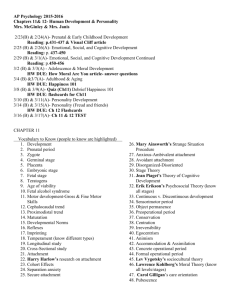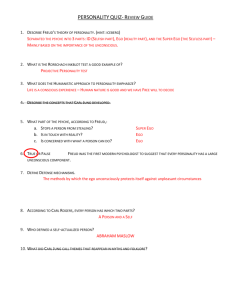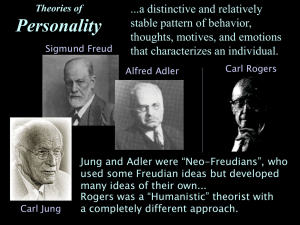Chapter 12 Personality
advertisement
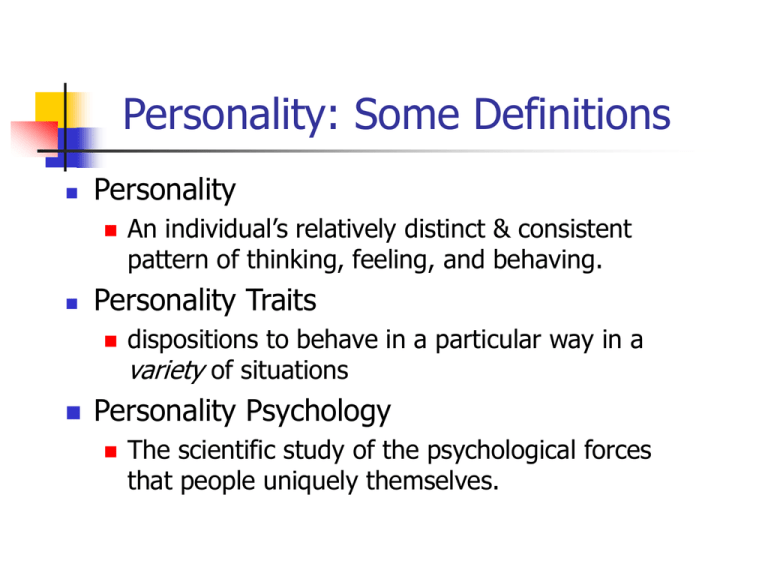
Personality: Some Definitions Personality Personality Traits An individual’s relatively distinct & consistent pattern of thinking, feeling, and behaving. dispositions to behave in a particular way in a variety of situations Personality Psychology The scientific study of the psychological forces that people uniquely themselves. The Main Themes of Course Interactionist model of behavior Genes, environment, experiences Many causes for behavior Behavior varies in different situations Diversity & Commonality Idiographic & nomothetic Consistency & variability Findings based on research Behavior is Multi-faceted Empirical studies Replication of studies Generalizability of findings Applicable to real life Validity of theories in personal experiences Useful in predicting or explaining behavior The 8 Basic Aspects Psychoanalytic Skinner, Dollard, Miller Allport, Cattell, Eysenk Humanistic Kelly, Bandura Trait Pavlov, Eysenck Behaviorist Cognitive Jung, Horney, Adler Biological Freud Neo-Analytic Rogers, Maslow Interactionist Murray, Mischel Psychodynamic Perspectives: Freud Psychoanalytic theory unconscious drives & motives sexual & aggressive urges emphasis on early childhood experiences Structure of personality id (pleasure principle) ego (reality principle) super ego (moral values/beliefs) Defense Mechanisms Conflicts: Id & Super Ego Goal is to reduce anxiety Common defenses Denial, repression, rationalization Psychodynamic Perspectives: Freud Psychosexual Stages of Development Oral, anal, phallic, latent, genital Emphasis placed on early development Trauma at a stage leads to “fixation” Consciousness (levels of awareness) conscious, preconscious, unconscious Traumatic early childhood experiences repressed into the unconscious Neo-Analysts Carl Jung - Analytical Psychology Alfred Adler - Individual Psychology Archetypes & the collective unconscious types: introverts/extroverts (Myers-Briggs test) striving for superiority & the inferiority complex effects of birth order on personality development Karen Horney – Early Feminist Basic anxiety Neurotic coping strategies Biological Perspectives Biological influences on personality Twin studies behavior is determined by genes behavioral tendencies are inherited twins are more alike in certain characteristics than siblings and unrelated persons Some biologically based traits extraversion vs introversion optimistic/positive vs pessimistic/negative exploratory/risk-taking vs cautious/anxious Behavioral/Learning Perspectives Behaviorism psychology should study only behavior observable, can be studied scientifically rejected notion of the unconscious Personality is behavior behavior is the result of classical or operant conditioning determinism: behavior is caused by environmental stimuli and situations (no free will) behavior follows “laws” of reinforcement and past experience Cognitive/Social Learning Theory Cognitive model Explanatory Styles people think, problem-solve, reason, etc. Perceptual indiosyncrasies Perceptions are individual Attributions, locus of control, learned helplessness Social- Cognitive Learning we learn by observing others behave and observing the consequences that follow can choose to follow model or not Traits and Skills Introversion-Extroversion George Allport’s Trait Psychology The Big 5 Jung’s 16 PF Q-test data O. C. E. A. N. Henry Murray’s Needs and Presses Expressive Styles Skills & Intelligence Humanistic-Existential Perspective Humanism Person-centered theory - Carl Rogers self-concept (who you believe you are) congruence vs incongruence (being your true self) Existential Anxiety emphasis on the unique qualities of individual & on free will opposed to propositions of psychoanalysts and behaviorists Anxiety: Rollo May Meaning of life – Victor Frankl Self-Actualization - Abraham Maslow emphasized healthy aspects of human behavior self-actualization (need to fulfill your potential)

